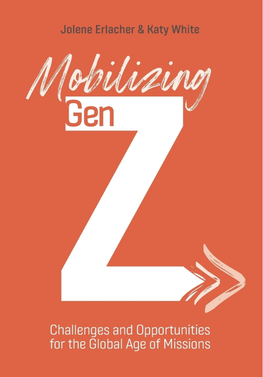posts
|
Jolene Erlacher and Katy White. Mobilizing GenZ: Challenges and Opportunities for the Global Age of Missions. Pasadena: William Carey Publishing, 2022. x + 182pp. Paperback. $14.99 (originally published in the July-September, 2023 edition of EMQ).
In Mobilizing GenZ, Erlacher and White aim to shed light on the identity of GenZ (those born between 1996 and 2010), to understand their virtues and struggles, and to offer insights on mobilizing them for the ongoing work of global mission. The book is divided into four main sections. In part 1, the authors offer context on the present state of missions, including the cultures of western sending countries and the current status of global Christianity. In part 2, they survey the identity, motivations, and faith of GenZ. Given this background, in part 3, they suggest relevant approaches toward mobilizing GenZ for mission. In the final part, they anticipate the future of mission and offer further insights for mobilization and sending. Mobilizing GenZ has some noteworthy strengths. First, the authors do a good job of describing GenZ and particularly showing how they are distinct from millennials. For example, while younger millennials are digital natives, this description is true of all of GenZ. They have never not been online. This has, of course, created problems such as a lack of social and communication skills, higher levels of anxiety, and greater exposure to pornography. Because of access to information, including online education, GenZ has the potential to be the most educated generation to date. While millennials are more concerned about addressing problems in the world, GenZ tends to be more individualistic and focused on happiness and stability. Though GenZ has had less real-world work experience than previous generations, they do tend to be more pragmatic and concerned about financial stability. Second, Erlacher and White build on this description of GenZ and provide some good insights into mobilizing the present generation for mission. Drawing from their professional strengths, they emphasize building long-term relationships with GenZ and coaching them toward connecting with their calling. Part of this coaching involves asking good open-ended questions. In Appendix D, they provide a list of good questions to ask. They also emphasize the need to connect with them through relevant media, including texting and social media. That said, the authors emphasize challenging GenZ to overcome biblical illiteracy and to become biblically rooted disciples. In addition to these affirmations, I have two critiques. First, in part 1, the authors rely on some rather dated material to sketch out the picture of the present context of global mission. They were particularly reliant on the 2009 edition of Perspectives on the World Christian Mission. Second, while the composite profile of Gen Z in part 2 of the work was helpful, it really did not go beyond what other authors such as Tim Elmore and Jean Twenge have already done. Who will benefit from reading this book? I recommend it to mission organization mobilizers, church mission committees or advocacy teams, church and parachurch leaders working among GenZ, as well as Christian university professors training students for global mission. Further Reading Barna Group. The Future of Missions: 10 Questions About Global Ministry that the Church Must Answer with the Next Generation. Ventura: Barna Group, 2020. Elmore, Tim and McPeak, Andrew. Generation Z Unfiltered: Facing Nine Hidden Challenges of the Most Anxious Population. Atlanta: Growing Leaders, 2019. |
Archives
November 2023
|

 RSS Feed
RSS Feed
